Rose water has long been used to make recipes taste and smell divine. It has a lovely floral aroma that adds sweetness and depth to many foods.
However, if you want something different from rose water in your dish, don’t worry!
Numerous substitutes can add similar flavor profiles with just a few twists of ingredients.
Keep reading to learn more about what you can substitute for rose water in your recipe masterpieces!
What Is Rose Water?
Rose water is a flavoring and aromatic liquid made from the distillation of rose petals.
It has a floral flavor that works well in sweet and savory dishes.
Rose water enhances the flavor of desserts, drinks, soups, stews, sauces, rice dishes, and much more.
It can be used instead of other sweeteners, such as honey or sugar and is a great way to add a new flavor dimension to dishes.
Rose water can be purchased in bottles or as a concentrate, but it is easy to make your own at home.
To make rose water, fresh petals are placed in distilled water and heated in a pot on the stove.
The liquid is then strained, cooled, and stored in an airtight container for future use.
Rose water should be refrigerated to prevent spoilage due to its high sugar content.
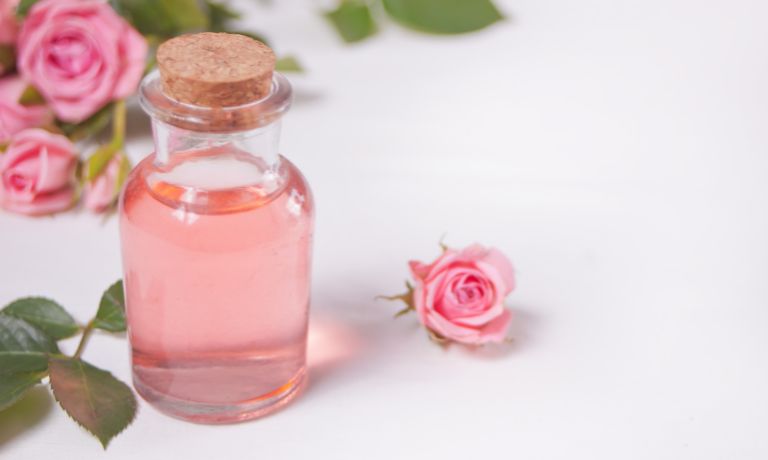
Substitutes For Rose Water
Rose water is common in many Middle Eastern cuisines, especially Persian and Indian.
It adds flavor and scent to dishes and provides an attractive pink hue.
However, if it’s unavailable or you prefer a milder taste, several options can be used for similar effects.
Rose Syrup
Rose Syrup is a sweet syrup made from rose petals. It has a distinct floral flavor and aroma.
Rose syrup can add sweetness or fragrance to desserts, beverages, sauces, dressings and more.
The intense flavor of the syrup allows cooks to use less sugar than regular granulated sugar.
It also adds a subtle floral aroma to food and drinks, making it ideal for adding an extra dimension of flavor.
Rose syrup is easy to use in sweet and savory dishes – simply add a few spoonfuls to your dish or beverage of choice to get that delicate rose taste.
With its pleasant flavor and aroma, rose syrup is an excellent way to add a special touch to any dish.
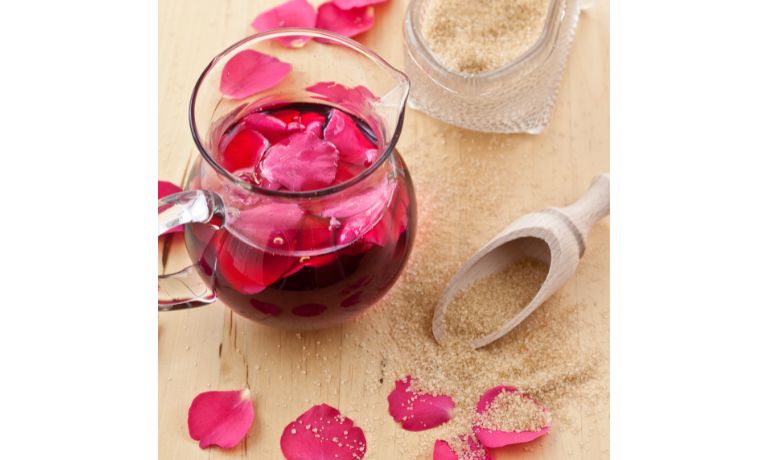
Rose Extract
Rose extract is a concentrated liquid form of the rose plant and its buds, which can be used as a flavoring agent in cooking.
It contains all of the flavors and aromas of natural roses without adding any water content that comes with using rose water.
Rose extract has been concentrated to an even more intense level than rose water.
So it can be used in much smaller quantities, making it a useful and cost-effective alternative.
It can be added to everything from sweet desserts like rose macarons to savory elements like soups and stews.
Rose extract also adds a pleasant floral fragrance to baking recipes, which is why it has become popular in home baking.
Finally, rose extract can be mixed into drinks and cocktails for an aromatic twist on traditional drinks.
Vanilla Extract
Vanilla extract is a liquid made from the seeds of vanilla beans.
It has a sweet, floral aroma and flavor that makes it popular in baking recipes and other dishes.
Vanilla extract is sometimes used as a substitute for rose water, which has a similar sweetness and scent.
The advantage of using vanilla extract instead of rose water is that it often contains more flavor and a stronger aroma.
The extract is also a cost-effective alternative as it is less expensive than rose water.
Vanilla can be used in various recipes such as ice cream, cakes, cookies, desserts, chocolates, and more.
It can also make perfumes and scented candles for those who want to add a pleasant scent to their home.
Vanilla extract is an excellent alternative for those who want the same sweet aroma of rose water without spending too much money.
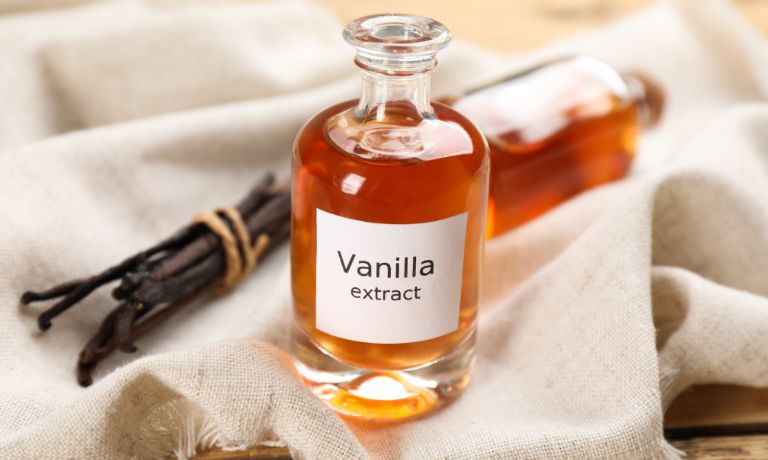
Lavender Extract
Lavender extract is a flavorless, odorless liquid derived from the essential oils of lavender flowers.
It is commonly used in cooking and baking as a natural flavoring or for its medicinal properties.
The lavender extract has a milder flavor than rose water and is less likely to overpower other flavors.
Its light floral aroma makes it great for baking sweet treats like cookies or cakes.
You can also mix lavender extract with herbs and spices to create a unique blend.
Almond Extract
Almond extract is a flavoring made from oils extracted from almonds. It is widely used in baking and cooking due to its sweet, nutty flavor.
Almond extract offers a similar sweetness and richness without the strong floral notes often associated with rose water.
Additionally, almond extract is more accessible than rose water, as it can be found in the baking aisle of almost any grocery store.
Almond extract can be used in recipes that call for a subtle nutty flavor or a hint of sweetness – such as crepes, pancakes, souffles and mousses.
It can also enhance the flavor of baked goods like muffins, cakes, cookies and pies.
When using almond extract as a substitute for rose water, use about half the amount you would have used for rose water in the recipe.
This way, you can get the desired sweetness without overpowering the other flavors in your dish.
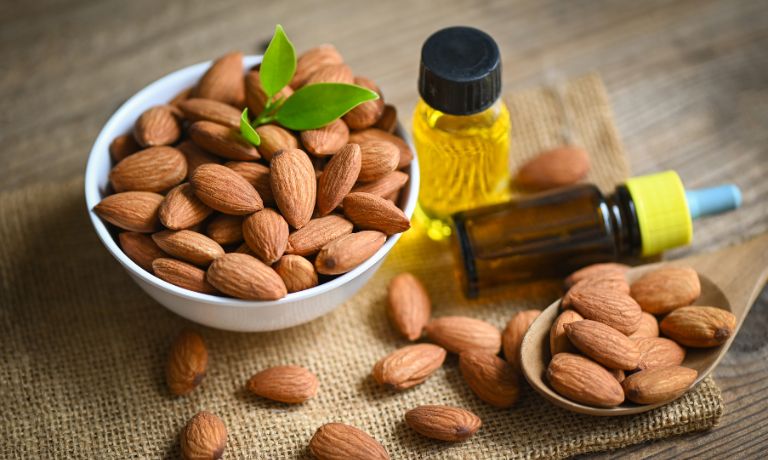
Dried Hibiscus
Dried Hibiscus is a naturally derived herb used in cooking for centuries.
It has a tart, cranberry-like flavor and is often called “Flor de Jamaica” or “Jamaica Flower”.
Hibiscus contains similar notes of floral sweetness to rose water but with a more tart finish.
The dried herb is easy to store and can last long, making it an ideal ingredient for flavoring everything from salads to desserts.
It is also packed with antioxidants, vitamins, and minerals, making it a great way to add nutrition to your meals.
In addition, the bright red color of hibiscus makes it a great garnish for salads, desserts, and other dishes.
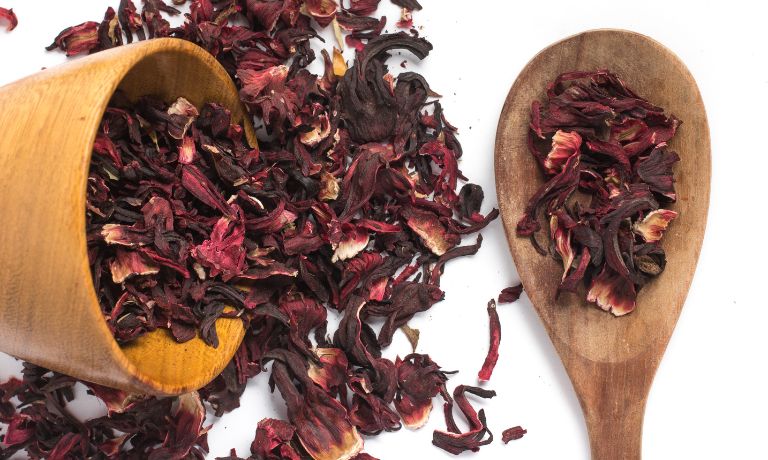
Cardamom
Cardamom (Elettaria cardamomum) is a spice native to India and Sri Lanka. It has a distinct, sweet flavor with hints of citrus, mint and ginger.
Cardamom can be used whole or ground into powder form for cooking, baking, and beverage flavoring.
In Middle Eastern cuisine, cardamom is a key ingredient in many dishes, such as kibbeh, baklava and ma’amoul cookies.
Cardamom can also be used to flavor curries, desserts and drinks.
Cardamom can make an excellent substitute for rose water in cooking.
It has a similar sweetness with a more complex flavor profile, making it a versatile ingredient for many dishes.

FAQs
Does Rose Water Expire?
Yes, rose water does have an expiration date.
The shelf life of rose water depends on the amount of preservatives added to the product and how it is stored.
What Flavor Does Rose Water Have?
Rose water has a subtle, sweet floral aroma and flavor that can add depth to dishes.
The flavor is often described as similar to the scent of roses, with light citrus notes.
Does Rose Water Taste Good?
Yes, rose water does have a unique and pleasant flavor that adds an interesting depth to dishes.
The taste of rose water can be described as delicate and sweet with a subtle floral aroma.
It pairs well with sweet and savory dishes, making it a versatile ingredient in many cuisines.
Conclusion
Rose water, vanilla extract, lavender extract, almond extract, dried hibiscus and cardamom are all excellent options to substitute for rose water.
Each ingredient offers a unique flavor profile that can be used in various recipes.
Whether you are looking for the subtle sweetness of rose water or something more complex like cardamom, an alternative can easily be used in your cooking.
Be sure to experiment with these ingredients and find the best fit for your needs.

